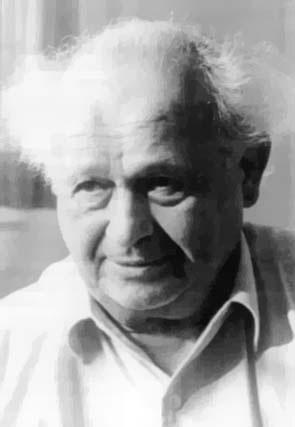The Founder
 Moshé Feldenkrais (1904-1984) was born in a Hasidic Jewish family in the Ukraine. At fourteen, he left home to move to Palestine, which was then under British mandate. In 1930 he moved to Paris to study engineering and physics. He received a doctorate from the Sorbonne in applied physics.
Moshé Feldenkrais (1904-1984) was born in a Hasidic Jewish family in the Ukraine. At fourteen, he left home to move to Palestine, which was then under British mandate. In 1930 he moved to Paris to study engineering and physics. He received a doctorate from the Sorbonne in applied physics.
He was a brilliant intellectual (he was an assistant in the research team of Frédéric Joliot en Irène Curie), a sports aficionado (he was very fond of football) and an devoted practitioner of the martial arts (he first studied Jiu Jitsu for self-defense when he moved to Palestine and later introduced Judo to Europe by starting the first Judo dojo in Paris).
He synthesised several revolutionary concepts of his time, from scientific ideas (such as engineering, physics and neurology, with influences by Karl Pribram, Margaret Mead and Ericksonian hypnotherapy) to spiritual ideas (Gurdjeff, Krishnamurthi). Other influences were the work of Heinrich Jacoby, Elsa Gindler and Mathias Alexander and his bond with the East (through his practice of the martial arts and a fascination with yogic body control). An equally important influence, child development, came from his wife who was a pediatrician. He bundled all of this knowledge in what later became the Feldenkrais Method.
After a debilitating knee injury which occurred on the football field, he was confronted with a discouraging prognosis. He refused to undergo an operation because of the unsure outcome and instead developed his own method of treatment. His goal was not to heal the injuries but instead to live a full and joyous life in spite of having damaged knees. The key to his Method is the understanding of neuroplasticity and the possibility all humans have to adjust to new conditions in life (a process which implies learning), regardless of one’s age.
